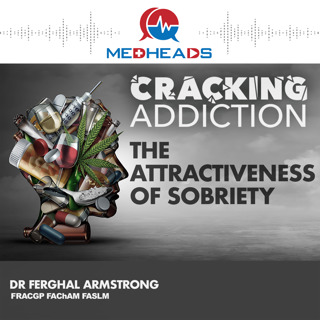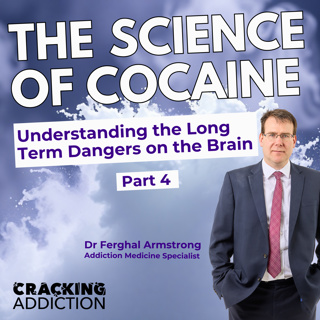
How Does Cocaine Permanently Change Your Brain Structure?
If you've ever wondered how cocaine impacts cognitive function, emotional regulation, and the relentless cycle of addiction, then you're in the right place. Witness how cocaine wreaks havoc on the prefrontal cortex, amygdala, hippocampus, and more, leading to devastating memory deficits, decision-making impairments, and risk of psychosis.Join us in exploring the grim reality of cocaine's influence on brain structure, including gray matter reduction and dopamine receptor loss, revealed through advanced neuroimaging studies. The revelations of how these changes manifest in everyday life— from blunted pleasure to heightened anxiety and stress sensitization— will leave you astounded.Chapters00:00:00 Introduction and Recap on Previous Episode00:00:35 Neuroanatomical Damage from Chronic Cocaine Use00:01:30 Cardiovascular Effects and Stroke Risks00:02:38 Neurochemical Imbalances and Neurotransmitter Dysregulation00:03:42 Psychological Impairments from Chronic Cocaine Use00:04:38 Emotional Dysregulation and Increased Impulsivity00:05:44 Structural Brain Changes in Chronic Cocaine Users00:06:38 Long Term Recovery Challenges00:07:40 Conclusion and Final Thoughts
5 Mars 8min
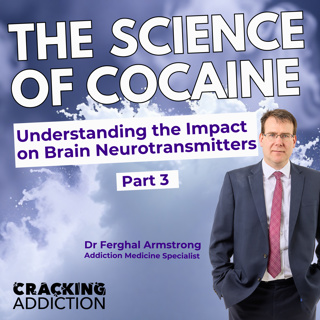
Your Brain on Cocaine - The SHOCKING Truth About Dopamine!
In this video, I uncover the secrets behind cocaine's manipulation of our dopamine system, which plays a pivotal role in reward, motivation, and addiction. Whether you're curious about the science or looking to understand the mechanics behind addiction, this video is your starting point.We'll explore how cocaine, in its many forms like cocaine hydrochloride, freebase, and crack, disrupts your brain's delicate balance. By blocking the dopamine transporter, cocaine creates a dopamine overload, leading to euphoria and stimulation. However, this seemingly pleasant effect harbors a darker consequence. Our deep dive doesn't stop at dopamine.We'll traverse various brain regions influenced by cocaine, witnessing its impact on the meso limbic system responsible for reward and reinforcement, and the mesocortical system overseeing decision making and impulse control. The stakes are high as we venture into the realms of stress and arousal, exploring how cocaine tips the balance and intensifies norepinephrine release, contributing to increased heart rates and blood pressure and significantly elevating the risks of heart attacks or strokes.Chapters00:00:00 Introduction and Overview 00:00:44 Cocaine and the Dopamine System 00:01:25 Mechanism of Action: Dopamine Transporter (DAT) Blockage00:02:24 Neurotransmitter Spillover: Serotonin and Norepinephrine 00:03:33 Cocaine's Effects on Reward Pathway 00:04:16 Role of the Nucleus Accumbens and Amygdala00:05:21 Hippocampus and Memory Formation 00:06:17 Decision Making and Impulse Control: Mesocortical System00:07:02 Motor System and Nigrostriatal Pathway 00:07:54 Stress and Arousal: Hypothalamus 00:08:00 Conclusion
27 Feb 8min
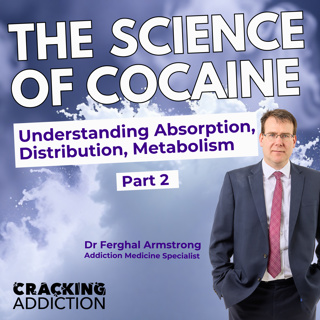
The Science Behind Cocaine Drug Testing You NEED to Know
Are you curious about how cocaine works in the body and the secrets behind successful drug testing? Look no further! In this eye-opening video, I delve deep into cocaine's kinetics, covering everything from absorption and distribution to metabolism and excretion. We explore how various routes of administration—like snorting, smoking, and injection—affect cocaine's absorption rate and the resulting emotional highs. Learn why bioavailability is greatest through inhalation and intravenous use, and discover the factors influencing this potent drug's absorption and distribution.We also highlight crucial information on cocaine metabolism, including its breakdown into metabolites like benzoylecgonine, norcocaine, and cocaethylene. You will learn why certain combinations, such as cocaine with alcohol, can lead to detrimental effects and prolonged drug detection times. Armed with this knowledge, you'll better understand the intricacies of urine drug testing and how metabolites linger in the system for days to weeks, depending on user habits.Chapters00:00:00 Introduction to Cocaine Kinetics00:00:47 Cocaine Absorption Methods00:01:48 Distribution of Cocaine00:02:35 Cocaine Metabolism00:04:22 Metabolic Pathways and Key Harm Reduction Intervention00:05:21 Detailed Metabolites of Cocaine00:07:06 Half-Life of Cocaine and Its Metabolites00:08:17 Detection Methods for Cocaine in Biological Matrices00:09:03 Overview of Biological Matrices for Cocaine Detection00:10:47 Considerations for Cocaine Detection00:11:27 Implications for Drug Testing00:12:07 Conclusion and Next Episode Preview
20 Feb 12min
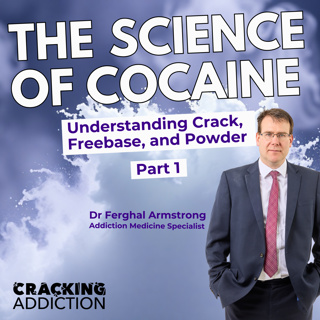
The Science Behind Different Types of Cocaine Explained Simply!
Join Addiction medicine specialist Dr. Ferghal Armstrong as he demystifies the complexities surrounding cocaine and its various forms. Derived from the coca plant native to South America, cocaine is a drug that has captivated cultures for centuries—both for its ceremonial use by indigenous peoples and its controversial place in modern society. Dr. Armstrong walks you through the historical context of cocaine, its initial uses, and the evolution of its reputation from a local anaesthetic to a highly addictive substance.Discover the clinical effects that draw individuals to use cocaine, from the euphoric highs to the concerning long-term health risks such as cardiovascular problems, mental health issues, and physical deterioration. Learn about the distinct processes that differentiate cocaine hydrochloride, the easily snorted or injected powder, from freebase cocaine and crack cocaine, both of which are smokable and deliver an even more rapid high.With insights into the risky manufacturing methods and the physicochemical properties that influence how cocaine is consumed, this video encourages viewers to reflect on the profound impact this drug has on individuals and communities. Prepare to gain knowledge, awareness, and a sharper understanding of the intricacies of cocaine addiction in this first episode of the Cracking Addiction series.Chapters00:00:00 Introduction to Cocaine and Its Forms00:01:08 Historical and Medical Background of Cocaine00:02:20 Risks and Long-term Effects of Cocaine Use00:03:31 Cocaine Production: From Plant to Powder00:04:33 Understanding Cocaine Hydrochloride00:05:50 Insights into Freebase Cocaine00:07:24 Exploring Crack Cocaine00:08:14 Differentiating the Forms of Cocaine00:09:51 Conclusion and Key Takeaways
12 Feb 8min
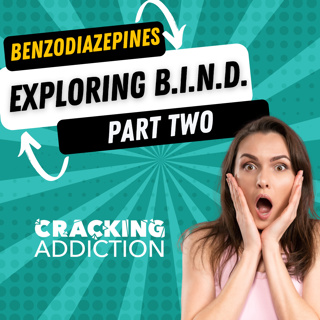
Ditch the Anxiety! Safe Benzodiazepine Tapering Strategies
If you're struggling with benzodiazepine withdrawal, this video shares safe tapering strategies to help you ditch the anxiety and regain control. Learn about benzodiazepine induced neurological dysfunction (BIND) and how to overcome it. In this episode, Dr Ferghal Armstrong discusses the mechanisms of benzodiazepine induced neurological dysfunction (BIND) and the complexities of benzodiazepine withdrawal. He explains that benzodiazepines and Z drugs increase the effect of the inhibitory neurotransmitter GABA, which leads the brain to compensate by increasing excitotoxic glutamate. Over time, this balance shift can lead to severe withdrawal symptoms and heightened anxiety, among other issues. Dr Armstrong also compares BIND to conditions like fibromyalgia and opioid-induced hyperalgesia, providing a robust framework for understanding the distressing experiences faced by those on long-term benzodiazepines. 00:00 GABA's Impact and Brain Compensation 03:50 Paradox of Drug-Induced Sensitisation 08:12 Benzodiazepine Tapering Principles 10:23 Lifestyle Medicine for Withdrawal 13:33 Farewell from Cracking Addiction
5 Feb 13min

5 Alarming Signs You're Experiencing BIND from Benzodiazepines
If you're experiencing BIND from benzodiazepines, watch out for these alarming signs of neurological dysfunction and cognitive impairment. This video will help you understand the risks of long-term benzodiazepine use. Episode Focus: Benzodiazepine-Induced Neurological Dysfunction (BIND) In this episode, we explore the multiple facets of benzodiazepine-induced neurological dysfunction (BIND). This condition encompasses cognitive impairments associated with both long-term benzodiazepine use and withdrawal, continuing up to 42 months after cessation of the drug. Dr. Armstrong provides clinically-backed insights, guiding us through how BIND manifests, the range of symptoms it can cause, and the significant, long-lasting repercussions on cognitive function. 00:00 Long-Term Benzodiazepine Cognitive Impairments 04:21 Benzodiazepines: Long-Term Cognitive Impairment 07:47 Risks of Long-Term Benzodiazepine Use
29 Jan 9min
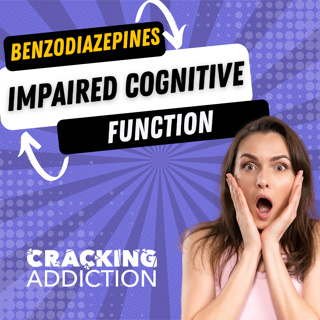
5 Shocking Ways Cognitive Impairment Affects Your Daily Life
Are you struggling with benzodiazepine dependence, looking to understand their impact, or need tips on tapering off? You’ve come to the right place! In this episode of "Cracking Addiction," I delve deep into the world of benzodiazepines, exploring their role in cognitive impairment, addiction potential, and their crucial use in alcohol withdrawal management. With keywords like benzodiazepines, addiction, and alcohol withdrawal, this video is a must-watch for anyone dealing with these powerful medications. Firstly, we shed light on how benzodiazepines impair cognitive function, causing attention deficits, concentration issues, and even long-term psychomotor impairments. But the conversation doesn't stop there; I explain why these drugs can be highly addictive due to their euphorogenic potential and rapid onset, highlighting which specific benzodiazepines carry the highest addiction risks. Then, we shift focus to benzodiazepines' indispensable role in treating alcohol withdrawal. I break down different strategies, from front-loading regimes to symptom-triggered sedation, to ensure a safe and effective withdrawal process. Lastly, we tackle the challenging topic of tapering benzodiazepines, offering practical tips and guidelines on tapering speeds, minimising withdrawal symptoms, and ensuring a smooth transition. 00:00:00 Introduction to Benzodiazepines 00:00:30 Benzodiazepines and Cognitive Function 00:01:00 Short-term Use: Anterograde Amnesia and Learning Impairments 00:01:30 Long-term Use: Concentration, Psychomotor Function, and Driving Risks 00:02:00 Cognitive Impairment Duration after Cessation 00:03:00 Benzodiazepine Addiction and Euphorogenicity 00:04:10 Benzodiazepines and Comorbid Conditions 00:04:40 Alcohol Use Disorder and Benzodiazepines 00:05:00 Mental Health Comorbidity and Substance Use 00:05:30 Therapeutic Uses: Alcohol Withdrawal Management 00:06:15 Alcohol Withdrawal Regimes: Front Loading, Tapering, and Symptom-Triggered 00:06:50 Safe Cessation Post-Alcohol Withdrawal 00:08:20 Benzodiazepine Tapering in Long-Term Users 00:09:30 Managing Illicit Benzodiazepine Dependency 00:10:30 Tapering Strategies: Converting to Diazepam 00:11:20 Requirements for Safe Diazepam Use 00:12:00 Dose Reduction Speeds and Inpatient vs Outpatient Strategies 00:14:10 Negotiating Tapering with Patients 00:14:50 Episode Summary
22 Jan 14min
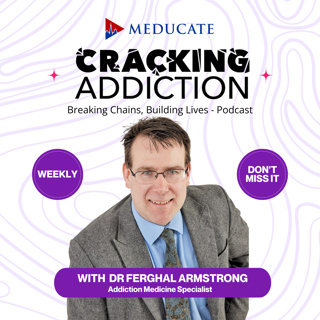
Benzodiazepine Side Effects That Will Make You Rethink Everything
In this eye-opening episode of Cracking Addiction, we delve deep into the intricate world of benzodiazepine withdrawal and its impact on chronic pain and anxiety. If you've ever struggled with benzodiazepine use or are curious about how these medications work, this video is for you! 🌟 Discover the critical differences between clinical tolerance and dependence, and understand why the Royal College of Psychiatrists advises limiting benzodiazepine use to no more than one month. We explore the alarming reality that prolonged benzodiazepine use can create a second condition — dependence — which can look strikingly similar to anxiety disorders. Learn about the withdrawal symptoms using my handy mnemonic "AMPS," which helps identify anxiety, autonomic hyperarousal, muscular symptoms, perceptual abnormalities, and more. You'll also gain insights into the timeline and duration of withdrawal symptoms based on different benzodiazepines' half-lives. Additionally, we discuss how benzodiazepines influence pain management, often leading to greater pain severity and higher risk opioid prescriptions. We also shed light on the specific challenges faced by patients with panic disorders, emphasising why benzodiazepines are not recommended for long-term treatment. 00:00:00 Introduction to Benzodiazepine Withdrawal 00:00:48 Tolerance to Benzodiazepines 00:02:21 Understanding Dependence on Benzodiazepines 00:03:17 Signs and Symptoms of Benzodiazepine Withdrawal 00:05:10 Timing and Half-life of Benzodiazepines 00:08:05 Role of Benzodiazepines in Pain Management 00:10:06 Benzodiazepines and Anxiety Disorders 00:11:21 Conclusion and Summary
16 Jan 11min
